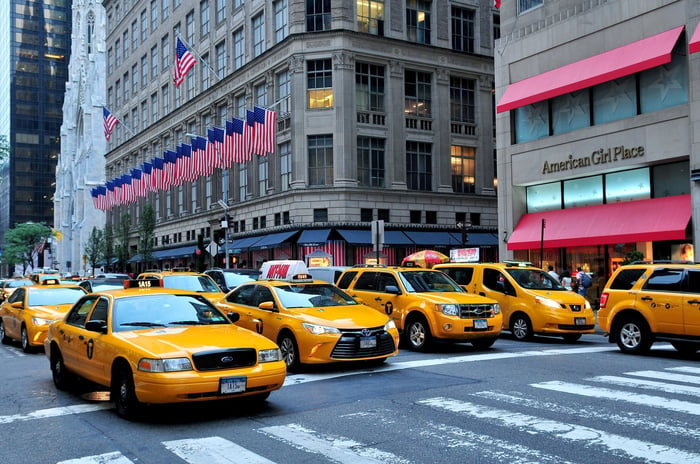A new activist investor has arrived in the department-store space, this time at Hudson's Bay (HBC). Real estate-focused investment firm Land and Buildings Investment Management recently announced that it had acquired a 4.3% stake in the Canadian department-store conglomerate.
Activist investors routinely push for sweeping changes. But Land and Buildings' proposals are even more radical than the typical activist investor plan. In short, it wants Hudson's Bay to consider shutting down a large portion of its retail operations to sell off or redevelop the underlying real estate.
There's no assurance that Hudson's Bay will agree to this plan. But if it does close a large number of stores in the U.S., it could produce a big windfall for rivals such as Nordstrom (JWN -0.21%) and Macy's (M 2.94%).
Hudson's Bay has an immaculate real estate portfolio
Over the course of more than a decade, Richard Baker, currently the executive chairman of Hudson's Bay, has bought up several high-end department-store chains around the globe. In the U.S., Hudson's Bay owns the upscale Lord & Taylor and Saks Fifth Avenue chains.
Real estate has been a key consideration in Baker's deal-making. In late 2013, Hudson's Bay bought Saks Fifth Avenue for $2.9 billion. A year later, it got an appraisal of the Saks flagship store in Manhattan, which valued the building at a stunning $3.7 billion.

The Saks Fifth Avenue flagship store has an appraised value of $3.7 billion. Image source: Pixabay.
According to company estimates, Hudson's Bay's real estate portfolio, net of debt, is worth about four times its market cap as of the end of last week. Management has made efforts to highlight this real estate value by selling joint-venture interests in many of its properties and getting appraisals for its two Manhattan flagships. However, investors haven't given Hudson's Bay much credit for this real estate value.
The underlying retail business is struggling
Looking at Hudson's Bay's recent financial results, it's not surprising that the stock has been performing poorly. The company lost money in 2016 and has produced negative free cash flow in each of the past two years. While most of the losses last year were concentrated in Europe, the company's U.S. operations were not profitable, either.
Comparable-store sales fell again in the first quarter of fiscal 2017. Saks Fifth Avenue experienced a 4.8% comp-sales decline; Hudson's Bay didn't report Lord & Taylor's results separately, but that chain probably experienced at least the same amount of sales erosion last quarter.
Hudson's Bay is targeting hundreds of millions of dollars in annual expense savings through a new cost-cutting program. It has also reorganized the Lord & Taylor management team to focus on addressing the sales weakness there. But in light of the challenging retail climate in the U.S., these cost-cutting efforts may not return the company to profitability.
A bold idea
This is where Land and Buildings' plan comes into play. In a letter sent to the Hudson's Bay board, Land and Buildings bluntly stated: "Hudson's Bay is a real estate company, full stop. If there is a smarter and better use of any or all of the locations, stores should be closed and redeveloped and put toward their optimal use."
The Saks flagship store is the most notable example. As of a few years ago, it generated annual sales of more than $600 million, which works out to roughly $1,000 per square foot. Sales may have declined somewhat since then, but the store probably continues to generate plenty of profit.
However, that largely reflects its prime location across the street from Rockefeller Center. The store may be profitable in theory, but it's highly unlikely that it generates enough cash to offset the opportunity cost of selling it for $3 billion to $4 billion -- or leasing it to tenants who would pay the sky-high rents that are common in the area.
Many other Saks and Lord & Taylor stores are in wealthy, densely populated areas, where space is at a premium. Given that Hudson's Bay isn't profitable in the U.S., it might make sense to sell off or redevelop many of the non-flagship Saks and Lord & Taylor locations as well.
Good news for rivals
In recent years, Macy's has made plans to close several profitable stores where the value of the real estate outweighed the value of continuing to operate. But a major downsizing -- or outright liquidation -- of the Saks Fifth Avenue and Lord & Taylor chains would be one of the biggest changes to the U.S. department-store landscape in decades.
Nordstrom and Macy's upscale Bloomingdale's chain -- and to a lesser extent, Neiman Marcus -- would probably be the primary beneficiaries. As the largest remaining luxury department stores, they would be well positioned to capture some of the sales that have been going to Saks and Lord & Taylor. Indeed, Nordstrom, Bloomingdale's, and Neiman Marcus have numerous stores in the same malls as Saks Fifth Avenue and Lord & Taylor (or very close by).
Today, there are probably too many luxury department stores in the U.S., especially in the Northeast, where Lord & Taylor has nearly all of its 50 full-line stores. As a result, many of the top upscale department-store chains are unprofitable. Downsizing by any of the weaker players will help Nordstrom and Macy's subsidiary Bloomingdale's solidify their positions in the upscale department-store market.





